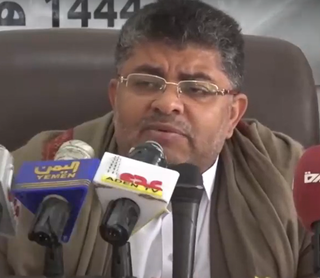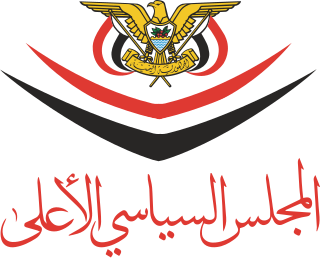
The Houthi movement, officially the Ansar Allah, is a Zaydi Shia Islamist political and military organization that emerged from Yemen in the 1990s. It is predominantly made up of Zaydi Shias, with their namesake leadership being drawn largely from the Houthi tribe. The group has been a central player in Yemen's civil war, drawing widespread international condemnation for its human rights abuses, including targeting civilians and using child soldiers. The movement is designated as a terrorist organization by some countries.

The Cabinet of Yemen refers to the governing body of the internationally recognized government of the Republic of Yemen, led by its President Rashad al-Alimi, who is also the chairman of the Presidential Leadership Council (PLC), the governing body of Yemeni republic.

United Nations Security Council Resolution 2014 was unanimously adopted on 21 October 2011.
Fares Mohammed Manaa is a top Yemeni arms-dealer, businessman, rebel commander and politician. He is said to be Yemen's most famous arms-dealer. Manaa was born on February 8, 1965, in the northern city of Saada. He was an ally of Yemeni President Ali Abdullah Saleh and member of his ruling GPC party and served as head of his presidential committee and as head of a local council tasked with mediating a peace-deal between the Yemeni government and Houthis during the Shia insurgency in Yemen. His brother was the governor of Saada Governorate at the time.

Jamal Benomar is a former UN diplomat. He worked at the UN for 25 years, including as a Special Envoy for Yemen and a special adviser to former Secretary-General Ban Ki-moon. He is currently chair of the International Center for Dialogue Initiatives.

The National Dialogue Conference (NDC) was a transitional dialogue process held at the Movenpick Hotel in Sanaa, Yemen from March 18, 2013 to January 24, 2014, as part of the Yemeni crisis reconciliation efforts.

The Houthi takeover in Yemen, also known by the Houthis as the September 21 Revolution, or 2014–15 Yemeni coup d'état, was a popular revolution against Yemeni President Abdrabbuh Mansur Hadi led by the Houthis and their supporters that pushed the Yemeni government from power. It had origins in Houthi-led protests that began the previous month, and escalated when the Houthis stormed the Yemeni capital Sanaa on 21 September 2014, causing the resignation of Prime Minister Mohammed Basindawa, and later the resignation of President Abdrabbuh Mansur Hadi and his ministers on 22 January 2015 after Houthi forces seized the presidential palace, residence, and key military installations, and the formation of a ruling council by Houthi militants on 6 February 2015.

Mohammed al-Houthi is a Yemeni politician who is the former President of the Revolutionary Committee or Revolutionary Council, a body formed by Houthi militants and the de facto President of Yemen. He was one of the military field commanders who led the group's seizure of the Yemeni capital Sana’a in September 2014, and eventually became the de facto leader of Yemen after the Houthi takeover of the Yemeni government in 2015. He is a cousin of Abdul-Malik Badreddin al-Houthi, the group's leader.

The Yemeni crisis began with the 2011–2012 revolution against President Abdullah Saleh, who had led Yemen for 33 years. After Saleh left office in early 2012 as part of a mediated agreement between the Yemeni government and opposition groups, the government led by Saleh's former vice president, Abdrabbuh Mansur Hadi, struggled to unite the fractious political landscape of the country and fend off threats both from Al-Qaeda in the Arabian Peninsula and from Houthi militants that had been waging a protracted insurgency in the north for years.

The Yemeni civil war is an ongoing multilateral civil war that began in late 2014 mainly between the Rashad al-Alimi-led Presidential Leadership Council and the Mahdi al-Mashat-led Supreme Political Council, along with their supporters and allies. Both claim to constitute the official government of Yemen.

On 26 March 2015, Saudi Arabia, leading a coalition of nine countries from West Asia and North Africa, launched a military intervention in Yemen at the request of Yemeni president Abdrabbuh Mansur Hadi, who had been ousted from the capital, Sanaa, in September 2014 by Houthi insurgents during the Yemeni Civil War. Efforts by the United Nations to facilitate a power sharing arrangement under a new transitional government collapsed, leading to escalating conflict between government forces, Houthi rebels, and other armed groups, which culminated in Hadi fleeing to Saudi Arabia shortly before it began military operations in the country.
International reactions to the Saudi-led intervention in Yemen of 2015 were mixed. Most other Arab League nations and several Western governments backed the Saudi Arabia-led military coalition, but other governments warned against an escalation in the violent situation in Yemen.

War crimes and human rights violations, committed by all warring parties, have been widespread throughout the Yemeni civil war. This includes the two main groups involved in the ongoing conflict: forces loyal to the current Yemeni president, Abdrabbuh Mansur Hadi, and Houthis and other forces supporting Ali Abdullah Saleh, the former Yemeni president. Al-Qaeda in the Arabian Peninsula and the Islamic State of Iraq and the Levant have also carried out attacks in Yemen. The Saudi-led coalition, backed by the United States and other nations, has also been accused of violating human rights and breaking international law, especially in regards to airstrikes that repeatedly hit civilian targets.

The Supreme Political Council is an extraconstitutional collective head of state and executive established in 2016 in Sanaa by the Houthi movement and the pro-Houthi faction of the General People's Congress (GPC) to rule Yemen opposed to the Presidential Leadership Council (PLC) in Aden. The SPC carries out the functions of head of state in Yemen, appointing the country's cabinet and managing the Yemen's state affairs in a bid to fill in political vacuum during the Yemeni Civil War. The Council aims to outline a basis for running the country and managing state affairs on the basis of the constitution. Since 2018 the SPC has been headed by Mahdi al-Mashat as Chairman of the Council.

The blockade of Yemen refers to a sea, land and air blockade on Yemen which started with the positioning of Saudi Arabian warships in Yemeni waters in 2015 with the Saudi Arabian-led intervention in Yemen. In November 2017, after a Houthi missile heading towards King Khalid International Airport was intercepted, the Saudi-led military coalition stated it would close all sea land and air ports to Yemen, but shortly began reopening them after criticism from the United Nations and over 20 aid groups and some humanitarian supplies were allowed into the country. In March 2021, Saudi Arabia denied the blockade continued, however, UN authorized ships continued to be delayed by Saudi warships.

On 14 April 2015, the United Nations Security Council adopted Resolution 2216 on Yemen. Fourteen members of the Council voted in favor, while only Russian Federation abstained. The Resolution imposed "sanctions on individuals undermining the stability of Yemen, calling all Yemeni parties, in particular the Houthis, to end violence and refrain from further unilateral actions that threatened the political transition."

The United Nations Security Council Resolution 2201 was unanimously adopted on 15 February 2015. The Security Council condemned the actions of the Houthis and demanded them to withdraw from the state institutions and release Yemeni president Abdrabbo Mansour Hadi.

The United Nations Security Council Resolution 2342 was unanimously adopted on 23 February 2017. The resolution renewed sanctions against individuals and entities engaging in acts that threatened the peace and stability of Yemen until 26 February 2018. The resolution prohibited the sale, supply and transfer of weapons to these individuals and entities, as well as to former Yemeni President Ali Abdullah Saleh, Houthi commanders Abdullah Yahya al Hakim and Abd al-Khaliq al-Huthi. The Security Council expressed concern at the situation and ongoing violence in Yemen. The council also extended the mandate of the Panel of Experts on Yemen until 28 March 2018.

United Nations Security Council Resolution 2722 was adopted on 10 January 2024. According to the resolution, the Security Council called for the Houthis in Yemen to immediately cease all attacks on merchant and commercial vessels and to release the captured ship Galaxy Leader and its crew.
Events in the year 2024 in the United Nations.













